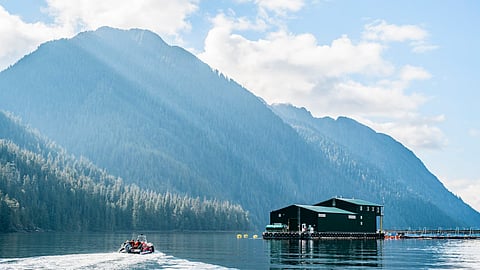

Cermaq open net-pen salmon farm in British Columbia, Canada. Fisheries and Oceans Canada informed farming license holders earlier this week of the delay of the draft transition framework.
Photo: Cermaq Canada.
When in June the Government of Canada announced it would ban open net-pen salmon aquaculture in the coastal waters of British Columbia by June 30, 2029, it also said that Fisheries and Oceans Canada (DFO) would publish a draft transition plan by the end of July 2024. However, the month is over and the promised draft transition framework for salmon farming in BC has been delayed.
According to information provided by the BC Salmon Farmers Association (BCSFA), salmon farming license holders were informed of the delay earlier this week. However, no new publication date was announced beyond reporting the delay could push publication to September 2024. After hearing the news, BC salmon farmers say they are "disappointed and concerned."
"Today, I'm announcing the essence of a responsible, realistic, and achievable transition that ensures the protection of wild species, food security and the vital economic development of British Columbia's First Nations, coastal communities and others, as we keep working towards a final transition plan by 2025," said Canadian Minister of Fisheries, Oceans and Coast Guard, Diane Lebouthillier, in the June ban announcement.
Immediately, the Canadian Aquaculture Industry Alliance (CAIA) President & CEO, Timothy Kennedy answered saying that the announced objective by 2029 for BC salmon farming was the opposite: "irresponsible, unrealistic, unreasonable and unachievable." Now, the BCSFA insists on the idea saying that the timeline proposed by the DFO for the complete transition is unrealistic.
British Columbia salmon farmers say it undermines the Federal Government's commitment to science-based decision-making, restoration of wild salmon populations, support for United Nations Declaration on the Rights of Indigenous Peoples (UNDRIP) and rural coastal communities, growth of Canada's Blue Economy, increased food security, and support for young Canadians.
"The rural coastal communities and employees who rely on salmon farming have been in a constant state of uncertainty since 2019 when the transition commitment was first announced," said Executive Director of the BC Salmon Farmers Association, Brian Kingzet. "The ongoing delays and decisions made by the federal government continue to cause concern and stress on these families and communities as they do not know what the future holds for them."
"Our sector has worked tirelessly over the past few years and submitted thousands of pages of documentation to the federal government to show our commitment to this process," the BCSFA Executive Director continued. "The federal government knew that the five-year timeline to transition to closed containment or land-based was unrealistic, and the delay in releasing the draft Transition Framework will further inhibit our sector's ability to meet the already demanding timeline set by DFO."
Despite what they describe as an "ongoing challenge," BC salmon farmers say the industry will persist in fighting for their communities and seeking a responsible, realistic and achievable path forward, and remain hopeful that the Federal Government's draft transition framework will provide that opportunity.
They are not willing to give up the fight, nor are the First Nations supporting open salmon aquaculture in BC. After learning of the delay in the submission of the draft transition framework for salmon farming in BC, the Coalition of First Nations for Finfish Stewardship spoke out in a tweet posted on the social network X (formerly Twitter).
"First Nations are stretching their legs and finding their voices when it comes to self-determination and defending their communities," it said. "Rightsholder Nations who wish to keep salmon farming in their waters will continue to advocate for their right to lead the transition of salmon farms in their traditional territories."
